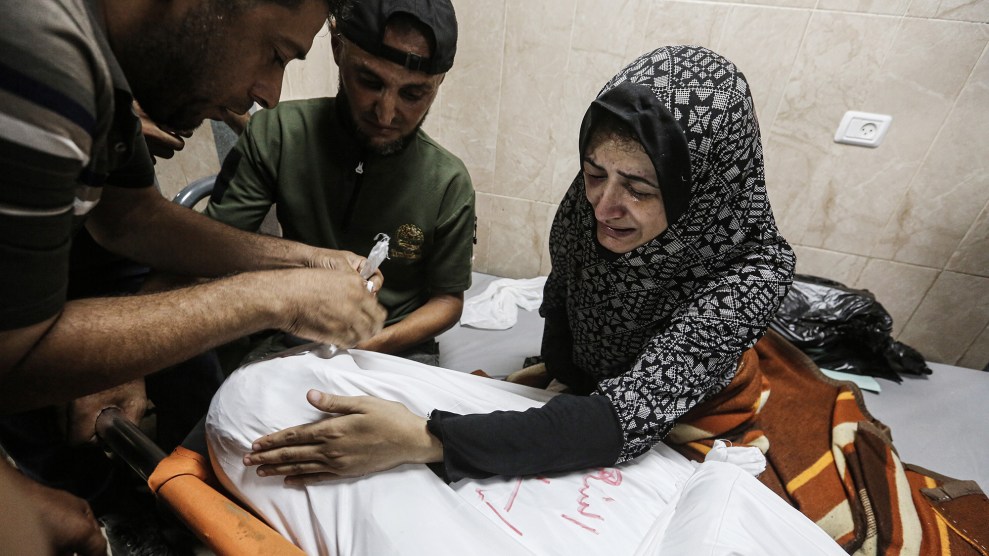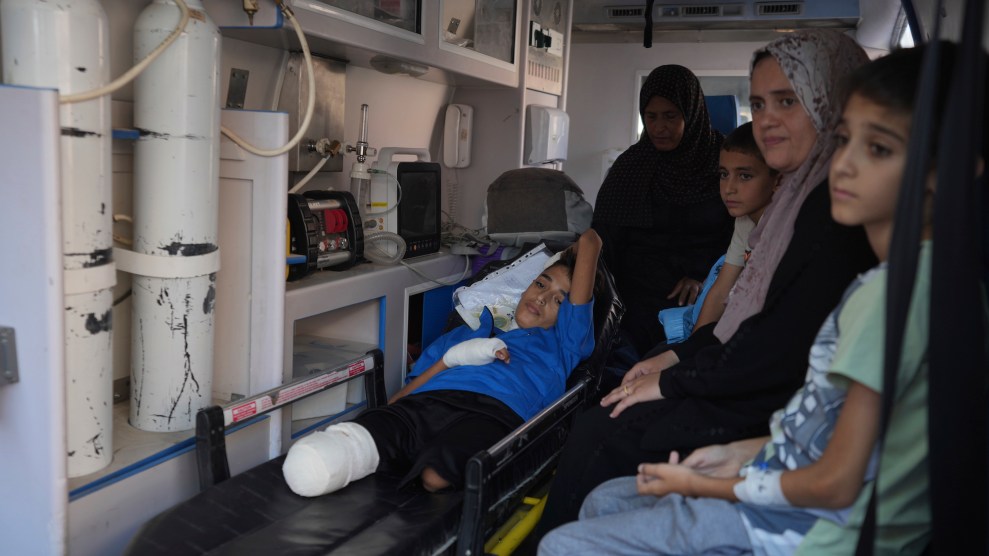
Palestinians mourn the death of their relatives at the Aqsa Martyrs Hospital in Deir el-Balah on July 1, 2024, following Israeli bombardments in the central Gaza Strip.Omar Ashtawy/APA Images/ZUMA
On July 5, the Lancet, one of the most famous medical journals in the world, published a letter from researchers with estimates of the death toll in Gaza from Israel’s nine-month invasion.
Factoring in a possible ratio of four indirect deaths to each direct death, researchers Dr. Rasha Khatib, Dr. Martin McKee, and Dr. Salim Yusuf wrote that “it is not implausible to estimate that up to 186,000 or even more deaths could be attributable to the current conflict in Gaza.” That is nearly five times the 38,000 dead reported by the Gaza Health Ministry, the only organization conducting regular counts of the dead on the ground. That number is equivalent to 8 percent of Gaza’s population.
Now, researchers are saying what is hard to stomach: The horrific number of dead presented daily as a result of Israel’s campaign in Gaza could be a severe undercount.
Until the end of the conflict, a precise count of the dead is not possible. But as the conflict continues the estimates used have political implications. Debates over the death count hover in discussions about aid from the United States, debates about South Africa’s case claiming Israel is committing genocide, and arguments over how humanitarian assistance will reach Palestinians.
The health ministry has been continually criticized by American pundits and politicians for overcounting the dead to further Hamas’ political goals. President Joe Biden, only three weeks into the war, said he had no confidence in “the number that the Palestinians are using” to calculate their dead. On June 27, the United States House of Representatives passed an amendment barring the State Department from using the ministry’s death statistics because of its association with Hamas. The ministry, like every other part of the Gaza Strip’s government, is under the rule of the territory’s governing party. But the group’s death counts have repeatedly been found reliable by outside researchers, as well as the World Health Organization and the United Nations.
Rep. Rashida Tlaib (D-Mich.), the only Palestinian American member of Congress, voted against the amendment. “There is so much anti-Palestinian racism in this chamber that my colleagues don’t even want to acknowledge that Palestinians exist at all—not when they’re alive, and now, not even when they’re dead,” Tlaib said on the House floor. “This is genocide denial.”
The authors of the Lancet letter aren’t the only scholars who think that the ministry’s number could be a severe undercount. Researchers at the Johns Hopkins Center for Humanitarian Health and the London School of Hygiene and Tropical Medicine produced a report early this year projecting direct and indirect deaths likely to occur in Gaza between February and August of 2024. Their data suggested tens of thousands of indirect deaths beyond those represented in the health ministry’s numbers.
As of February 19, when the first Gaza Projections Report was published, the Gaza Health Ministry said that about 29,000 Palestinians had been killed in the war. The Johns Hopkins researchers predicted then that, barring a ceasefire, anywhere between 58,269 and 74,290 additional people would die in Gaza before the second week of August (depending on factors like level of military escalation and potential epidemics).
Even if there had been a ceasefire, the Gaza Projections report said at least 6,000 additional people would likely have died of malnutrition, disease, and other preventable causes—in part because Gaza’s health care system has now been almost entirely destroyed.
The Gaza Projections numbers, like those estimated in the Lancet, are at least twice as high as those published by the health ministry.
“There is a need to record the scale and nature of suffering in this conflict,” the letter’s authors said. “Documenting the true scale is crucial for ensuring historical accountability and acknowledging the full cost of the war.”












